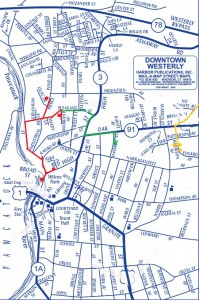As I mentioned in yesterday’s post, knowing where an ancestor was living within a town at a certain time can be extremely beneficial for a number of reasons. After listing all of the known locations of my ancestors in my hometown of Westerly, Rhode Island, I was able to plot all of these points on a map and see where they had lived and worked. One of the benefits of this knowledge is that, with modern technology, we can see the locations of many of our ancestors’ homes as they stand today. In many cases, the same houses they once occupied may still remain. Websites such as Google Maps, which offer virtual tours of locations around the globe, have greatly expanded the experience of discovering one’s family history.
Another reason to map the known homes of your ancestors is to see where an individual attended church (especially if their religion is known), where they went to school, and how far they walked to work each day. Finding the nearest church to the home of one’s ancestor may lead to church records that have not yet been explored, possibly revealing previously unknown information.
With this geographical and contextual knowledge, family historians can map out these locations and see the routes that a person’s ancestor could have taken to work or church. A text-based search of city directories will even allow a researcher to determine who occupied the houses next to their ancestors, which could reveal some family connections that might not have been noticed before. Tracing the paths of our ancestors is one method through which family historians can develop a narrative for the lives of their ancestors. No longer do we have to settle for simply knowing the town they lived in according to the census; instead, researchers can come closer to understanding the way their ancestors lived than ever before.
Share this:
About Zachary Garceau
Zachary J. Garceau is a former researcher at the New England Historic Genealogical Society. He joined the research staff after receiving a Master's degree in Historical Studies with a concentration in Public History from the University of Maryland-Baltimore County and a B.A. in history from the University of Rhode Island. He was a member of the Research Services team from 2014 to 2018, and now works as a technical writer. Zachary also works as a freelance writer, specializing in Rhode Island history, sports history, and French Canadian genealogy.View all posts by Zachary Garceau →
